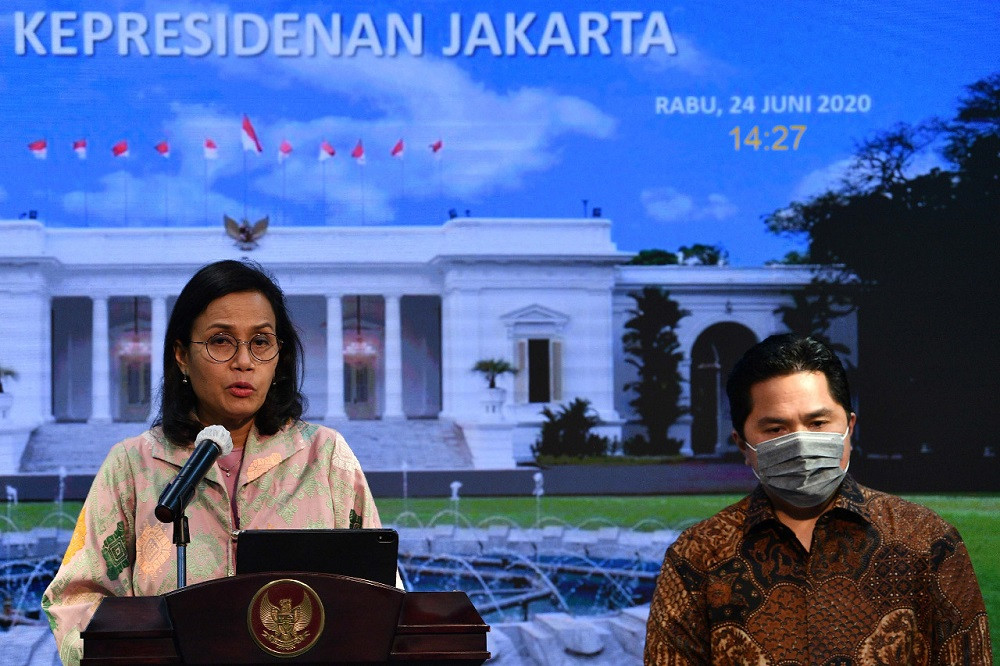Popular Reads
Top Results
Can't find what you're looking for?
View all search resultsPopular Reads
Top Results
Can't find what you're looking for?
View all search resultsCOVID-19: The catalyst for accelerating bank consolidation
The OJK has encouraged bank consolidation, given the number of banks that crowd the industry, some of which (especially the smaller ones) may be vulnerable to financial stress or pressure.
Change text size
Gift Premium Articles
to Anyone
A
s the rampaging COVID-19 pandemic continues to disrupt – and even paralyze – Indonesia’s economy and adversely affect financial stability, it has (or will) eventually taken a toll on the banking industry. The soaring number of non-performing loans or restructured loans would have negatively impacted banks’ cash inflows, triggering the pressing concern of the banks’ liquidity, and in turn, the banks’ financial soundness. While large banks may find a way to withstand the COVID-19 storm, small and medium-sized banks might find it harder to do so.
The government reacted rightly and quickly – in less than a month after it confirmed the first COVID-19 positive case – by issuing Regulation in Lieu of Law (Perppu) No. 1/2020 on state finances and the stability of the financial system policies for the mitigation of the COVID-19 pandemic and/or to deal with threats that are potentially harmful to the national economy and/or the stability of the financial system (GRL 1/2020). The Perppu has been approved by the House of Representatives to become Law No. 2/2020.
Learning from past financial crises and knowing that bank failure may lead to economic depression, Article 23 of Law 2/2020 authorizes the Indonesian Financial Services Authority (OJK) to be more involved in the business affairs of banks, among other things, by instructing the banks to conduct mergers, consolidation, acquisitions and/or integration (mandatory corporate actions).
In executing the mandate, the OJK then further regulates the legal landscape for mandatory corporate actions through Regulation No. 18/POJK.03/2020 on written instruction for the mitigation of bank problems (OJKR 18/2020). OJKR 18/2020 came into force on April 21, 2020.
Through OJKR 18/2020, the OJK wields power to force banks to initiate mandatory corporate actions if, based on the OJK’s assessment, the banks are suffering from a financial problem which may disrupt their business, and are deemed incapable of handling existing or future economic pressures. It will be the same case if the relevant controlling shareholders of the banks are incapable of strengthening their banks’ financial capability.
Moreover, the OJK may also instruct banks to accept (by becoming a counterparty of) the mandatory corporate actions if those banks, after the conclusion of such corporate actions, were found to satisfy the two criteria. First, for conventional banks and sharia commercial/rural banks, a soundness level of at least a composite rating –3 or PK-3. PK-3 means that a bank is reasonably sound to withstand significant adverse effect from the business conditions and external factors. Secondly, for rural banks, the minimal soundness level should be “reasonably sound” – which means having a credit score of between 66 and 81.
Upon receiving the OJK’s instruction (either to initiate or to accept), banks are required to prepare an action plan consisting of the process and schedule of the implementation of the mandatory corporate actions until its effective date and to assure its materialization by providing regular updates to the OJK.
Failing to do so, the OJK may impose on the banks and/or their respective principal parties (which are controlling shareholders, directors and commissioners) administrative sanctions in the form of written warnings and certain business restrictions as well as criminal sanctions.
Banks that are ordered to carry out mandatary corporate actions may be exempted from the requirements, such as single-presence policy, share ownership and the period to satisfy the minimum core capital.
It is no secret that the OJK has encouraged bank consolidation, given the number of banks that crowd the industry, some of which (especially the smaller ones) may be vulnerable to financial stress or pressure.
Late last year, the OJK issued regulation No. 41/POJK.03/2019 on mergers, consolidation, acquisitions, integration and conversion of commercial banks. This OJK regulation aims to bolster the consolidation of banks (particularly smaller banks), therefore reducing the number of banks in the already overbanked environment to create a robust, efficient and competitive banking industry.
Nevertheless, it appears the pressure on banks to consolidate has not been strong. According to OJK data on Indonesian banking, in February 2020 there were 110 commercial banks. This number was unchanged from September 2019. As for rural banks, the number was 1,542. The Indonesian Banks Association has said that 50 to 70 commercial banks is already sufficient for the industry.
But the devastating impact of the COVID-19 pandemic is certainly severe enough to force small or even mid-sized banks to merge. Hence, OJKR 18/2020 was issued as one of the safeguards to maintain financial stability in the banking sector.
Interestingly, looking from another perspective, the COVID 19 pandemic could be seen as an unexpected catalyst that spurs the consolidation of banks (either mandatorily, as the OJK could order, or voluntarily). The objective may not only maintain financial stability during the pandemic but also, for the long term, will create a more robust, more efficient and more competitive (by avoiding any unnecessary concentration) banking industry.
The COVID-19 pandemic will eventually see its sunset. However, economies are expected only to recover gradually. It is then reasonable to believe that even though borrowers’ loans have mostly been restructured (as each of the cases may be), repayment may still be a problem and lending may take some time to achieve the 2019 growth rate. Therefore, with the ever-increasing market competition, more stringent compliance requirements imposed by regulators – exacerbated by the COVID-19 pandemic – mean that consolidating makes more sense for banks.
***
Narada Kumara (partner), Febriantoro Suardy and Johanna Devi (associates) are lawyers at Budidjaja International Lawyers, practicing in commercial dispute resolution, bankruptcy & restructuring and banking & finance law. The views expressed are their own










